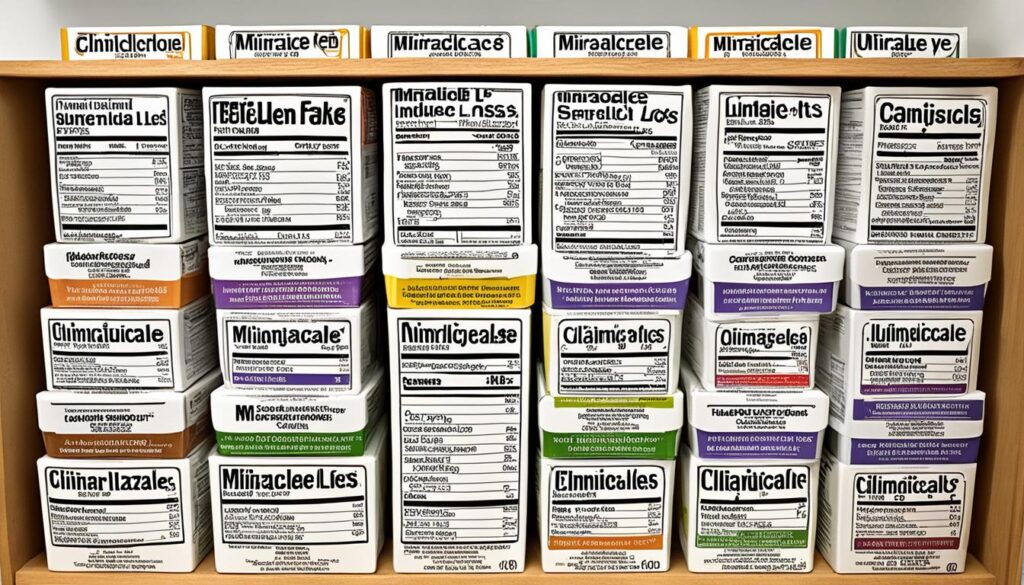Did you know that affiliate marketing scams cost businesses and individuals billions of dollars each year?
Whether you’re an affiliate marketer or an affiliate manager, it’s crucial to be aware of the scams that can jeopardize your success and reputation. In this article, we will delve into the world of affiliate marketing scams, providing you with valuable insights and practical tips to avoid falling victim to fraudulent activities.
From get-rich-quick schemes and pay-to-join programs to fake gurus and pyramid schemes, there are countless tactics that scammers use to exploit the affiliate marketing industry.
By understanding these scams and learning how to recognize their warning signs, you can protect your business and ensure a trustworthy affiliate marketing experience.
Is Affiliate Marketing Legit
In this section, we will address the question of is affiliate marketing legit? There may be doubts and misconceptions surrounding the industry, but we’re here to debunk them and provide evidence that affiliate marketing is indeed a legitimate and trustworthy business model. So, let’s dive in and explore the true nature of affiliate marketing.

Affiliate marketing is a performance-based marketing strategy where affiliates promote products or services on behalf of merchants and earn a commission for each sale or action generated through their efforts. It has gained immense popularity in recent years and has become a key source of income for many individuals and businesses.
So, what makes affiliate marketing a legitimate business model? Let’s take a look at some key factors:
- Transparency and Accountability: Affiliate marketing operates on a transparent framework where affiliates and merchants enter into mutually agreed-upon partnerships. The terms and conditions, commission rates, and performance metrics are clearly defined.
- Real Value Exchange: Unlike scams and fraudulent schemes, affiliate marketing relies on providing real value to consumers. Affiliates promote products and services that they genuinely believe in, and their success depends on delivering quality and relevant content to their audience.
- Legitimate Partnerships: Affiliate marketing involves partnerships between reputable affiliates and trustworthy merchants. These partnerships are built on trust, professionalism, and a shared interest in driving genuine sales and leads.
- Well-Established Networks and Platforms: Affiliate marketing operates within recognized networks and platforms that vet and monitor affiliates and merchants to ensure compliance with industry standards and regulations.
By understanding the true nature of the affiliate marketing industry, you can confidently engage in this legitimate business model without fear of participating in scams. With proper knowledge, research, and ethical practices, affiliate marketing can be a lucrative and rewarding endeavor for both affiliates and merchants.
Affiliate Marketing Scams Targeting Affiliates
In this section, we will focus on scams specifically targeting affiliate marketers. These scams can take various forms, including get-rich-quick schemes, pay-to-join programs, and fake gurus and courses. By understanding the common characteristics of these scams, you can better protect yourself and your business from falling victim to fraud. Let’s explore each type of scam in detail:
1. Get-Rich-Quick Schemes: These scams promise overnight success and enormous profits without any effort or skill required. They often prey on the desire for quick wealth and tempt unsuspecting affiliates with unrealistic income claims. Be wary of any program or opportunity that guarantees easy and rapid wealth accumulation, as it is the most common affiliate marketing scam.
2. Pay-to-Join Programs: These scams require affiliates to pay a fee or make purchases before joining the program. Legitimate affiliate programs should never ask for upfront payment to join. Be cautious when encountering any pay-to-join offers and thoroughly research their credibility.
3. Fake Gurus and Courses: Scammers posing as industry experts create and sell fake courses, promising to teach you the secrets to affiliate marketing success. These fraudulent gurus often provide outdated or superficial information and fail to deliver on their promises. Conduct thorough research and read reviews before investing in any training programs or mentorships.
To illustrate the different types of scams, here is an example of what a fake guru might promise:
“Learn the secret formula to earn six figures in just 30 days! Join my exclusive training program and become a top affiliate marketer effortlessly!”
In reality, these scams aim to exploit your enthusiasm and desire for success. By staying vigilant, conducting extensive research, and trusting your instincts, you can protect yourself from falling victim to affiliate marketing scams.

Now that we understand the different types of scams targeting affiliates, let’s dive deeper into each specific scam in the following sections to equip ourselves with the knowledge to spot and avoid them.
Get Rich Quick Schemes
In the world of affiliate marketing, it’s important to be cautious of get-rich-quick schemes that promise instant wealth and success. These schemes often prey on the desire for quick and easy money, luring unsuspecting individuals into fraudulent programs. This is why many wonder is affiliate marketing a scam? In this section, we will delve into the dangers posed by these schemes and provide valuable insights on how to spot and avoid them.
Case Study: My Online Business Education (MOBE)
One notorious example of a get-rich-quick scheme is My Online Business Education (MOBE). This scheme claimed to offer a revolutionary system that could generate massive profits with minimal effort.
However, investigations revealed that MOBE was nothing more than a deceptive pyramid scheme, with its participants being coerced into purchasing expensive training programs and recruiting new members to sustain the scheme, as seen by many of its affiliate marketing reviews.
By highlighting the tactics employed by MOBE, we can better understand the warning signs of get-rich-quick scams and protect ourselves from falling victim to similar schemes.
How To Spot A Get-Rich-Quick Scheme
Identifying a get-rich-quick scheme can be challenging since many of them are designed to appear legitimate on the surface. However, there are key indicators that can help you spot these scams:
- Unrealistic Claims: Be wary of schemes that promise quick and substantial earnings without any effort or skill.
- High Financial Commitment: If a scheme requires you to make expensive upfront payments or continuously invest large sums of money, it may be a red flag.
- Lack of Transparencyy: Legitimate business opportunities provide transparent information about their products, services, and revenue model. If a scheme lacks transparency or avoids answering direct questions, proceed with caution.
- Pressure to Recruit: Pyramid schemes often place a heavy emphasis on recruiting others rather than selling genuine products or services. If recruitment becomes the primary focus, be skeptical.
- Lack of Support or Training: Legitimate opportunities usually provide comprehensive training and ongoing support. If a scheme offers little to no guidance, it may indicate that they don’t have legitimate intentions.
How To Avoid Get-Rich-Quick Schemes
To protect yourself from get-rich-quick schemes, follow these tips:
- Do Your Research: Thoroughly investigate any opportunity before committing your time and resources. Look for reviews, testimonials, and feedback from reputable sources.
- Trust Your Instincts: If something seems too good to be true, it probably is. Trust your gut instinct and exercise caution when dealing with suspicious schemes.
- Seek Advice: Consult industry experts or mentors who can provide valuable guidance to help you differentiate between legitimate opportunities and scams.
- Ask Questions: Don’t hesitate to ask detailed questions about the opportunity, its revenue model, and the products or services being offered. Legitimate businesses will be transparent and responsive.
- Focus on Value: Legitimate affiliate marketing programs emphasize the value of the products or services being promoted. If the focus is solely on recruiting new members, it’s likely a pyramid scheme.
- Protect Your Personal Information: Be cautious about sharing personal and financial information with unknown entities. Scammers may attempt to steal your identity or use your information for fraudulent purposes.
By staying informed and vigilant, you can steer clear of get-rich-quick schemes and focus on genuine opportunities that offer long-term success and sustainable income.

Pay to Join Affiliate Programs
Pay-to-join affiliate programs have become increasingly common in the affiliate marketing industry. These programs require affiliates to pay fees or make purchases before they can join and start promoting products or services. While some legitimate affiliate programs may have associated costs, it is essential to be cautious and avoid falling prey to pay-to-join scams.
When considering a pay-to-join affiliate program, it’s crucial to look out for red flags that may indicate a scam. Here are some key pointers to help you distinguish between legitimate affiliate programs and pay-to-join scams:
- Research the program: Before investing any money, thoroughly research the affiliate program and the company behind it. Look for reviews, testimonials, and evidence of their legitimacy.
- Evaluate the costs: Consider the fees or purchases required for joining the program. Assess whether the costs align with industry standards and the potential benefits you will receive as an affiliate.
- Beware of high-pressure tactics: Be cautious of programs that pressure you into making quick decisions or use aggressive marketing techniques. Legitimate affiliate programs typically provide you with the necessary information and allow you to make an informed choice.
- Check the compensation structure: Ensure that the program offers fair and transparent compensation for your efforts. Avoid programs that primarily focus on recruitment rather than legitimate product promotion.
By following these guidelines, you can protect yourself from pay-to-join scams and ensure that you are investing in legitimate affiliate programs. Remember, legitimate affiliate programs may have associated costs, but they should provide tangible value and transparent compensation structures.
Fake Gurus and Courses
In the affiliate marketing industry, fake gurus and courses are a pervasive problem. Scammers take advantage of individuals’ desire for knowledge and success by offering fake expertise and misleading courses. As an affiliate marketer, it is crucial to be able to spot these fraudulent offerings to protect yourself and your business from falling victim to scams.
How To Spot Fake Gurus And Courses
Identifying fake gurus and courses can be challenging, but there are certain red flags to watch out for. Here are some tips to help you identify the imposters:
- Lack of verifiable credentials: Genuine experts in the affiliate marketing industry have a track record of success and can provide verifiable proof of their expertise. If a guru or course provider cannot provide credible evidence of their achievements, be cautious.
- Unrealistic promises: Fake gurus often make exaggerated claims of overnight success and large profits. Remember that affiliate marketing is a long-term, sustainable business model, and genuine experts will emphasize the need for hard work and dedication.
- Pressure tactics: Scammers may use high-pressure sales tactics to create a sense of urgency, pushing you to make impulsive decisions. Genuine experts will provide you with the information you need to make an informed choice without any pressure.
- Fake testimonials and reviews: Be wary of courses and gurus that showcase glowing testimonials and reviews that cannot be verified. Genuine experts will have legitimate testimonials from real people who have benefited from their teachings.
- Lack of transparency: Legitimate gurus and course providers are transparent about their methods and strategies. Beware of those who refuse to reveal their techniques or withhold crucial information as it may indicate a lack of credibility.
How To Avoid Fake Gurus And Courses
Protecting yourself from fake gurus and courses requires due diligence and careful research. Here are some steps to follow:
- Research the guru or course provider: Before investing your time and money, thoroughly research the guru or course provider. Look for reviews and testimonials from trusted sources, and check if they have a reputable online presence.
- Check for verifiable credentials: Genuine experts will have a proven track record in affiliate marketing. Look for gurus and course providers who can provide evidence of their success and have a strong reputation in the industry.
- Seek recommendations from trusted sources: Reach out to fellow affiliate marketers or industry professionals for recommendations on trusted gurus and courses. Personal referrals are often a reliable way to find legitimate resources.
- Read reviews and testimonials critically: When reading reviews and testimonials, exercise critical thinking. Look for specific details and evidence of genuine success rather than generic, overly positive statements.
- Look for money-back guarantees: Legitimate gurus and course providers often offer money-back guarantees to demonstrate their confidence in their offerings. This shows that they stand behind their teachings and are willing to provide refunds if their promises are not fulfilled.
By following these tips, you can avoid falling victim to fake gurus and courses, and instead choose reputable resources for your affiliate marketing education.

Pyramid Schemes and MLMs
In the world of affiliate marketing, it’s essential to be aware of the dangers posed by pyramid schemes and multi-level marketing (MLM) scams. These deceptive practices can quickly turn your dreams of financial success into a nightmare. To help you navigate through the hazards, we will examine a case study of a prominent MLM scam, Empower Network, and provide valuable guidance on how to identify MLM offers and avoid falling victim to pyramid schemes.
Case Study: Empower Network
Empower Network was a well-known MLM company that promised its participants substantial income through a network marketing structure. However, it turned out to be a classic pyramid scheme, relying heavily on recruitment rather than the sale of legitimate products or services.
The majority of participants ended up losing money, while only a small fraction managed to make any significant profits, as seen by many of their affiliate marketing review.
By analyzing case studies like Empower Network, we can gain insights into the deceptive techniques used by pyramid schemes. This knowledge will empower us to recognize the warning signs and protect ourselves from similar scams in the future.
How To Spot MLM Offers
Identifying MLM offers can be challenging because they often masquerade as legitimate business opportunities. However, there are certain red flags that can help you differentiate between a genuine affiliate marketing opportunity and an MLM scam:
- Focus on recruitment: MLMs place a heavy emphasis on recruiting new members rather than selling products or services. If the primary focus is on recruiting and building a network, rather than selling a valuable product, it’s likely an MLM.
- High upfront costs: MLMs often require participants to pay significant upfront fees or purchase inventory as a condition for joining. Beware of MLMs that require substantial financial investments before you can start earning.
- Complex compensation structure: MLM compensation plans can be excessively complicated and difficult to understand. If the earning potential is primarily tied to recruitment levels rather than product sales, it’s a clear sign of an MLM.
- Lack of retail focus: Legitimate affiliate marketing programs emphasize the sale of products or services to external customers. In contrast, MLMs tend to focus on recruiting new members to generate income from their purchases.
- Promises of easy wealth: MLMs often lure unsuspecting individuals with promises of quick and substantial wealth with little effort. Remember, genuine affiliate marketing requires hard work, dedication, and a focus on building a sustainable business.

Table: Comparison of Pyramid Schemes and Legitimate Affiliate Marketing
Note: This table is provided to assist in understanding the differences between pyramid schemes and legitimate affiliate marketing programs
| Aspects | Pyramid Schemes | Legitimate Affiliate Marketing |
|---|---|---|
| Primary focus | Recruiting new members | Sales of products or services |
| Compensation structure | Relies on recruitment levels | Based on commissions from product sales |
| Upfront costs | High upfront fees or inventory purchases | No or minimal upfront costs |
| Earning potential | Dependent on recruitment levels | Tied to product sales and successful marketing efforts |
| Long-term sustainability | Unsustainable, with only a few participants profiting | Offers potential for long-term, sustainable business growth |
Understanding the differences between pyramid schemes and legitimate affiliate marketing programs is crucial for protecting yourself and your financial well-being. By staying informed and exercising caution, you can avoid pyramid schemes and focus on building a successful and ethical affiliate marketing business.
Shady Products and Services
In the highly competitive world of affiliate marketing, it’s important to be cautious of shady products and services that can harm your reputation and earnings. Identifying scams in affiliate marketing products is crucial to avoid falling victim to fraudulent offerings. By staying vigilant and conducting thorough research, you can protect yourself and your audience from the negative consequences of these scams.
How To Spot A Shady Product Or Service
When evaluating affiliate marketing products or services, keep an eye out for the following warning signs:
- Lack of transparency: If a product or service fails to provide clear information about its features, pricing, or terms and conditions, it may be a red flag.
- Unrealistic claims: Be skeptical of exaggerated claims or promises of overnight success. Legitimate products and services are realistic about the time and effort required for success.
- Poor customer reviews: Research customer reviews and testimonials to gauge the experiences of others. If the majority of reviews are negative or seem fake, it’s a sign to proceed with caution.
- Unsecured payment processes: A reputable product or service will prioritize secure payment methods to protect your personal and financial information. Look for secure payment gateways and encryption protocols.
It’s important to note that these signs do not guarantee that a product or service is untrustworthy. However, they should raise your awareness and prompt you to conduct further investigation before making a decision.

Fake Products or Services
Case Study: The Herpes Blueprint
In this section, we will examine the issue of scams involving fake products or services in the affiliate marketing industry. One prominent case study that highlights the tactics used by fraudsters is The Herpes Blueprint. This fake product scam falsely claims to provide a cure for herpes, preying on vulnerable individuals seeking relief from their condition.

Scammers behind fake products or services often rely on deceptive marketing techniques and false promises to entice unsuspecting consumers. They exploit the trust placed in affiliate marketers to perpetuate their fraudulent schemes, ultimately causing harm to both the buyer and the reputation of the affiliate.
How To Spot Fake Products Or Services
To protect yourself from getting involved with fake products or services, it is crucial to be able to identify warning signs. Here are some red flags to watch out for:
- Unrealistic or exaggerated claims: Fake offerings often make grand promises that seem too good to be true. Be skeptical of any product or service that guarantees extraordinary results with minimal effort.
- Lack of transparency: Genuine products and services provide clear information about their ingredients, processes, or methodologies. If details are scarce or undisclosed, it is a cause for concern.
- Unverified testimonials or reviews: Be cautious if the product’s reviews or testimonials are solely positive or appear fabricated. Look for credible sources and cross-reference information to ensure authenticity.
- Missing or inadequate customer support: Legitimate products or services usually offer reliable customer support channels. If the contact information is vague or difficult to find, proceed with caution.
By paying attention to these signs, you can differentiate genuine offerings from counterfeit ones, safeguarding yourself and your audience from falling victim to scams.
Affiliate Marketing Scams Targeting Affiliate Managers
Did you know that affiliate managers are the targets of numerous scams in the affiliate marketing industry? It’s a shocking fact that highlights the need for strong security measures to protect your affiliate program from frauds aimed at affiliate managers. In this section, we will explore the various scams that target affiliate managers and provide you with valuable strategies to safeguard your program.
Click Fraud & Boot (Spoof) Traffic
In the world of affiliate marketing, click fraud and spoof traffic are common scams that can have detrimental effects on your affiliate campaigns. Click fraud refers to the fraudulent manipulation of click-through rates (CTRs) by artificially generating clicks on affiliate links, leading to inflated advertising costs and misleading campaign performance data. On the other hand, spoof traffic involves the use of fake or deceptive sources to drive traffic to your site, making it difficult to measure the actual effectiveness of your campaigns.
To protect your affiliate campaigns from click fraud and spoof traffic, it is essential to implement effective monitoring and fraud detection measures. Here are some strategies you can use:
- Use click tracking software: Leverage reliable click tracking software that can identify unusual click patterns and detect potential instances of click fraud. This software can help you monitor the source and nature of the clicks coming to your affiliate links, allowing you to filter out suspicious activity.
- Set click thresholds: Establish click thresholds to identify abnormal spikes in click activity. This can help you identify potential click fraud attempts and take necessary actions to mitigate the impact.
- Monitor referral traffic sources: Regularly review the sources of your referral traffic to ensure they align with your marketing efforts and audience targeting. If you notice unidentified or irrelevant sources sending a significant amount of traffic, investigate further to determine if it’s a case of spoof traffic.
- Employ IP filtering: Implement IP filtering to identify and block IP addresses associated with click fraud or spoof traffic. By blacklisting suspicious IPs, you can prevent further fraudulent activity from those sources.

Lead Frauds
In affiliate marketing, lead frauds are a significant concern for affiliate managers. Fraudulent leads can not only waste valuable resources but also undermine the effectiveness of an affiliate program. It’s crucial to identify and prevent lead frauds to ensure the quality and authenticity of leads generated through your program.
Scammers employ various tactics to generate fake leads, such as:
- Using automated tools to fabricate leads
- Manipulating user data to create multiple fake leads
- Purchasing leads from questionable sources
To protect your affiliate program against lead frauds, consider implementing the following strategies:
- Strict Validation Processes: Implement robust validation processes to verify the authenticity of leads before accepting them into your program. This could involve verifying user identities, cross-referencing information, and utilizing third-party tools for fraud detection.
- Establish Quality Control Measures: Set benchmarks and performance indicators to ensure the quality and relevance of leads. Regularly review lead sources and investigate any suspicious patterns or outliers.
- Partner With Trusted Affiliates: Take the time to vet and establish relationships with reputable affiliates who adhere to ethical practices. Conduct due diligence before accepting new affiliates into your program.
- Monitor and Analyze Lead Data: Continuously monitor and analyze lead data to identify any irregularities or suspicious activities. Look for any unexpected spikes in lead generation, unusual conversion rates, or discrepancies that may indicate fraudulent leads.
- Stay Informed: Keep yourself updated on the latest lead fraud tactics and industry best practices. Attend industry conferences, network with other affiliate managers, and stay connected with forums or groups dedicated to affiliate marketing.

Sale & Transaction Frauds
In the realm of affiliate marketing, sale and transaction frauds pose significant risks to both affiliates and affiliate managers. Fraudsters employ various methods to generate fraudulent sales, leading to potential financial losses and damage to the integrity of affiliate programs. However, by implementing robust tracking and verification systems, affiliate managers can effectively prevent such scams and safeguard their programs.
One common method used by fraudsters is the creation of fake transactions and sales to deceive affiliate managers and earn illegitimate commissions. These fraudulent activities can involve the use of stolen or fake payment details, manipulated tracking codes, or the exploitation of vulnerabilities in affiliate program systems.
To counter these scams, affiliate managers must establish strong tracking mechanisms to accurately verify and validate the legitimacy of each sale and transaction. This can be achieved through the use of secure payment gateways and affiliate tracking software that employ robust authentication protocols.
Furthermore, implementing strict approval processes and conducting regular audits can help identify and flag suspicious activities. By meticulously reviewing sales and transaction data, affiliate managers can spot anomalies and take immediate action to investigate and address any potential fraudulent activities.

Quote: “The key to preventing sale and transaction frauds lies in the implementation of reliable tracking and verification systems. By staying vigilant and continually monitoring for suspicious activities, affiliate managers can protect their programs and the integrity of the affiliate marketing industry.”
URL Hijacking (Typosquatting)
In the realm of affiliate marketing, one of the significant threats you need to be aware of is URL hijacking, also known as typosquatting. Scammers exploit this technique by creating websites with similar domain names or domain names that contain common typos, intending to redirect traffic and steal affiliate commissions.
When users make a typographical error while entering a URL in their browser, they may land on these malicious websites instead of the intended destination. This can lead to lost commissions for affiliate marketers and damage to their brand reputation.
To protect your affiliate brand and ensure that your commissions are not hijacked through URL manipulation, follow these techniques:
- Register multiple variations of your domain name to prevent scammers from utilizing similar names.
- Monitor your online presence regularly to identify any fraudulent websites attempting to mimic yours.
- Educate your audience about the importance of double-checking URLs and warning them about potential typosquatting scams.
- Implement advanced anti-phishing measures to detect and block fraudulent websites that try to hijack your traffic.

By being vigilant and proactive, you can protect your affiliate brand from URL hijacking scams, ensuring that you retain your earned commissions and maintain trust with your audience.
Cookie Stuffing
In the world of affiliate marketing, cookie stuffing is a deceptive practice used by scammers to manipulate cookies and unjustly claim affiliate commissions. It involves the insertion of unauthorized cookies onto the computers of unsuspecting users, often without their knowledge or consent. These cookies attribute sales or leads to the scammer, allowing them to earn commissions without actually driving any legitimate traffic or conversions.
Cookie stuffing scams can have a detrimental impact on both affiliates and affiliate managers. Affiliates may lose out on rightful earnings as their commissions are diverted to scammers. On the other hand, affiliate managers may suffer reputational damage and financial losses if their programs are associated with fraudulent activities.
However, there are strategies that affiliate managers can implement to protect their programs from cookie stuffing scams. By adopting secure and reliable tracking systems, they can ensure that cookies are tamper-proof and accurately attribute sales and leads to the appropriate affiliates. Additionally, implementing robust fraud detection measures can help identify and flag suspicious activities, enabling swift action to be taken against scammers.
Image:

It’s essential for affiliate managers to remain vigilant and stay informed about evolving cookie stuffing tactics. By educating themselves and their affiliates about the signs of cookie stuffing scams, they can proactively identify and address potential threats to their programs. Regular communication and sharing of best practices with affiliates can create a united front against fraudulent activities.
Google Ad Hijacking & Website Cloning
In the world of affiliate marketing, scammers are constantly devising new strategies to exploit unsuspecting affiliates and affiliate managers. Two particularly insidious scams that affiliates and affiliate managers need to be aware of are Google ad hijacking and website cloning.

Google Ad Hijacking
Google ad hijacking involves fraudsters replicating legitimate Google ads and diverting traffic to their own websites. By hijacking the ads, scammers can steal affiliate commissions that would have otherwise gone to the legitimate affiliate or affiliate manager.
To prevent Google ad hijacking, it’s crucial to regularly monitor your ad campaigns and keep an eye out for any suspicious activity. If you notice a significant drop in conversions or an unexplained increase in traffic to unfamiliar websites, it could be a sign of ad hijacking. In such cases, immediately report the issue to Google and provide any relevant evidence or documentation.
Website Cloning
Website cloning is another scam that targets affiliates and affiliate managers. In this scam, fraudsters create duplicate copies of legitimate websites in order to deceive visitors and steal affiliate commissions. These cloned websites often have striking similarities to the original sites, making it difficult for unsuspecting visitors to distinguish between the two.
To protect yourself and your brand from website cloning, regularly monitor your website’s online presence and perform periodic checks to ensure the integrity of your site. Use tools and services that can help you identify any unauthorized copies or phishing attempts. Additionally, consider implementing security measures such as SSL certificates and secure hosting to minimize the risk of website cloning.
Conclusion
In conclusion, it is crucial to be aware of the various scams that exist in the affiliate marketing industry. By understanding the tactics used by fraudsters, you can protect yourself and your business from falling victim to these scams. Throughout this article, we have discussed twelve common affiliate marketing scams and provided tips on how to avoid them.
Vigilance is key when it comes to preventing scams in affiliate marketing. Always research and thoroughly vet any program or course before investing your time or money. Look out for red flags such as get-rich-quick promises, pay-to-join requirements, and fake gurus offering false expertise.


